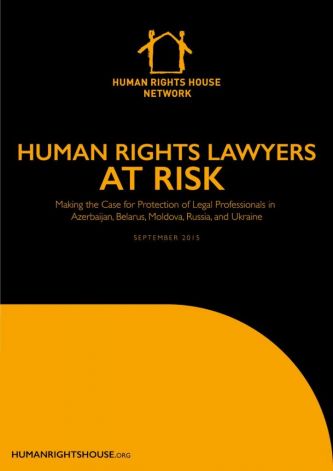Download: Human Rights Lawyers at Risk report (English)
Download: Human Rights Lawyers at Risk report (Russian)
The report draws on the knowledge of the Human Rights House Network and the expertise and experiences of alumni from the International Law in Advocacy (ILIA) programme. It is both an opposition to the repression of human rights lawyers and a push for better protection under guarantees and immunities.
Liudmila Ulyashyna, Manager of the ILIA programme, stated: “Human rights lawyers are both legal professionals and human rights defenders. Protection for lawyers enshrined in national and international law must be implemented and respected, while human rights guarantees must extend to all who work within human rights, including human rights lawyers. It is essential that we protect their right to exercise their legal activity, as well as their profession, as both make them human rights lawyers.”
The report outlines the persecution of prominent human rights lawyers in Azerbaijan, Belarus, Moldova, Russia, and Ukraine, and the grave consequences this has had for them and their clients’ access to human rights protection. The work of human rights lawyers is no longer efficient and safe; the principle of confidentiality is violated; the right of a client to protection is impeded; and trust in human rights instruments and the international courts will be diminished.
The report details specific cases of repression against human rights lawyers, such as against Intigam Aliyev in Azerbaijan, a prominent human rights lawyer and founder of the Legal Educational Society. He has now been sentenced to seven and a half years in prison on groundless charges. He had previously been excluded from the Bar Association and been the subject of various types of bureaucratic and legal harassment. When detained, Aliyev represented many cases to the European Court of Human Rights. The charges were aimed at silencing him and depriving Azerbaijani citizens of their right to appeal and seek justice before the court.
Liudmila Ulyashyna continued, “We have identified systematic retaliation against those seeking to employ human rights law and reprisals against lawyers using international legal remedies. We detailed this repression and devised recommendations for international organisations, governments, national and international professional bodies, lawyer associations, and non-governmental organisations.”
The report calls for:
- stronger protection of professional legal standards internationally;
- wider promotion of existing protection for human rights lawyers, through their rights as human rights defenders;
- an end to government interference and limitations on human rights lawyers’ ability to represent clients, including victims of human rights violations;
- respect for the independence of bar associations; disbarment must be limited to an administrative measure aimed at ensuring professional and ethical standards;
- respect for the guarantees and immunities of human rights lawyers, and for these to be equal to those of other lawyers;
- human rights lawyers to have the same level of access as other lawyers to their clients, and for them to have the same confidentiality of communications.
Documents:
-
- Report: Human Rights Lawyers at Risk
The report Human Rights Lawyers at Risk: Making the Case for Protection of Legal Professionals in Azerbaijan, Belarus, Moldova, Russia, and Ukraine was launched in Warsaw 23 September 2015.
- (Russian) Report: Human Rights Lawyers at Risk
In Russian, the report Human Rights Lawyers at Risk: Making the Case for Protection of Legal Professionals in Azerbaijan, Belarus, Moldova, Russia, and Ukraine. This was launched in Warsaw on 23 September 2015
- Report: Human Rights Lawyers at Risk
Press releases and lists of cases
Related Articles
-
-
- Unprecedented crackdown on civil society in Azerbaijan ahead of European Olympic Games, says report
- Azerbaijan: A year of unprecedented repression
- Prominent lawyers call for the release of Intigam Aliyev
- HRHN condemns the 7.5 years sentence for Intigam Aliyev
- New evidence weakens prosecution
- Intigam Aliyev in court: an observer’s testimony
-
About International Law in Advocacy
“International Law in Advocacy” is a program implemented by several
member organizations of the Human Rights House Network.
 The program aims to:
The program aims to:
- increase the knowledge and
skills of lawyers in international
human rights protection; - facilitate the implementation of
international human rights standards
in national practice; - provide better protection for HR defenders and victims of
fundamental rights violations.





